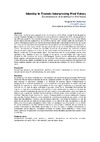Identificador persistente para citar o vincular este elemento:
https://accedacris.ulpgc.es/jspui/handle/10553/58445
| Campo DC | Valor | idioma |
|---|---|---|
| dc.contributor.author | Hart Robertson, Margaret | en_US |
| dc.date.accessioned | 2019-12-16T13:52:06Z | - |
| dc.date.available | 2019-12-16T13:52:06Z | - |
| dc.date.issued | 2015 | en_US |
| dc.identifier.isbn | 978-84-9042-185-7 | en_US |
| dc.identifier.other | Dialnet | - |
| dc.identifier.uri | https://accedacris.ulpgc.es/handle/10553/58445 | - |
| dc.description.abstract | Se analizan las dificultades implicadas en la interpretación intercultural del proyecto europeo Med Voices (Voces del Mediterráneo) enmarcado dentro del programa EuroMed Heritage II. El proyecto se diseñó para valorizar el patrimonio intangible y la identidad de diversos lugares «mediterráneos» y salvaguardarlos a través de productos de turismo cultural de corte participativo. Se realizó minería de datos de los registros de historia oral grabados de los trece lugares implicados en el proyecto para volcarlos en una base de datos multilingüe (cuya sede virtual fue la Universidad Metropolitana de Londres, a cargo de la coordinación del proyecto). El área mediterránea se definió en términos de esferas culturales braudelianas de rutas (comerciales: routes) y raíces (identidades: roots). Los lugares se eligieron por su grado de fragilidad identitaria debido a diversas causas: como resultado de guerras o conflictos (Palestina, Chipre norte/sur, El Líbano y Turquía), debido a tensiones tradicionales religiosas (por ejemplo, Granada, España) o como resultado de la aculturación producida por recibir turismo de masas (las Islas Baleares y Canarias). Las entrevistas transcritas y sus análisis se volcaron a la base de datos en dos idiomas: en inglés (como lingua franca) y en el idioma del lugar. Se proyectó la base de datos como recurso para investigadores (sobre todo, antropólogos), para empresas de turismo, diseño de nuevos productos y con fines educativos, además de para colegios e institutos. En este artículo, se analizan brevemente las dificultades encontradas a la hora de captar y trasladar efectivamente la idiosincracia cultural (dialecto, marcadores culturales incrustados, léxico específico y humor, entre otros) junto a las complicaciones de producir/reproducir textos diseñados para distintos usuarios finales simultáneos. | en_US |
| dc.description.abstract | Med Voices, the EU project organised within the framework of EuroMed Heritage II and designed to valorise intangible heritage and safeguard community identity is analysed here from the perspective of the difficulties posed for the translator/interpreter. The project was designed to mine the data offered by oral history archives registered in the 13 different partner sites involved (under the coordination of London Metropolitan University). The Mediterranean was defined in Braudelian terms of cultural routes and roots and the interviews were analysed from the perspective of rehabilitating community identity in places where the same was at risk for varying reasons: due to war or conflict (Palestine, North/South Cyprus, the Lebanon and Turkey, for example), on account of permanent and traditional religious tensions (Granada, Spain) or as a result of the cutural standardisation produced by mass tourism (the Balearic islands and the Canary Islands, Spain). The interviews and the corresponding analyses were uploaded onto a database in both the language of the partner site and English (the lingua franca) designed to offer resources for further anthropological research, tourism applications and product design together with educational packs for use in schools. The problems of capturing and transmitting cultural idiosyncrasy (dialect, embedded cultural markers, lexicon, humour) concisely and coherently are briefly analysed, together with the complexity of producing texts designed for various different endusers. | en_US |
| dc.language | eng | en_US |
| dc.publisher | Universidad de Las Palmas de Gran Canaria (ULPGC) | en_US |
| dc.source | Traducimos desde el sur: actas del VI Congreso Internacional de la Asociación Ibérica de Estudios de Traducción e Interpretación : Las Palmas de Gran Canaria, 23-25 de enero de 2013 / José Jorge Amigo Extremera (aut.), p. 673-682 | en_US |
| dc.subject | 63 Sociología | en_US |
| dc.subject | 570113 Lingüística aplicada a la traducción e interpretación | en_US |
| dc.subject.other | Interpreting (process) and interpretation (product) restrictions | en_US |
| dc.subject.other | Transference of cultural markers | en_US |
| dc.subject.other | Interpreting lato sensu | en_US |
| dc.subject.other | IT and interpreting | en_US |
| dc.subject.other | End-users | en_US |
| dc.subject.other | Skopos | en_US |
| dc.subject.other | Interpretación de marcadores culturales | en_US |
| dc.title | Identity in Transit: Interpreting Med Voices | en_US |
| dc.title.alternative | La interpretación de la identidad en Med Voices | en_US |
| dc.type | info:eu-repo/semantics/conferenceObject | en_US |
| dc.type | ConferenceObject | en_US |
| dc.relation.conference | VI Congreso Internacional de la Asociación Ibérica de Estudios de Traducción e Interpretación (AIETI 2013) | en_US |
| dc.identifier.url | http://dialnet.unirioja.es/servlet/articulo?codigo=5370738 | - |
| dc.identifier.absysnet | 711800 | - |
| dc.description.lastpage | 682 | en_US |
| dc.description.firstpage | 673 | en_US |
| dc.investigacion | Ciencias Sociales y Jurídicas | en_US |
| dc.type2 | Actas de congresos | en_US |
| dc.contributor.authordialnetid | 2635586 | - |
| dc.identifier.dialnet | 5370738ARTLIB | - |
| dc.utils.revision | Sí | en_US |
| dc.identifier.ulpgc | Sí | en_US |
| item.grantfulltext | open | - |
| item.fulltext | Con texto completo | - |
| crisitem.author.fullName | Hart Robertson, Margaret Jean | - |
| crisitem.event.eventsstartdate | 23-01-2013 | - |
| crisitem.event.eventsenddate | 25-01-2013 | - |
| Colección: | Actas de congresos | |
Visitas
75
actualizado el 31-oct-2024
Descargas
29
actualizado el 31-oct-2024
Google ScholarTM
Verifica
Altmetric
Comparte
Exporta metadatos
Los elementos en ULPGC accedaCRIS están protegidos por derechos de autor con todos los derechos reservados, a menos que se indique lo contrario.
